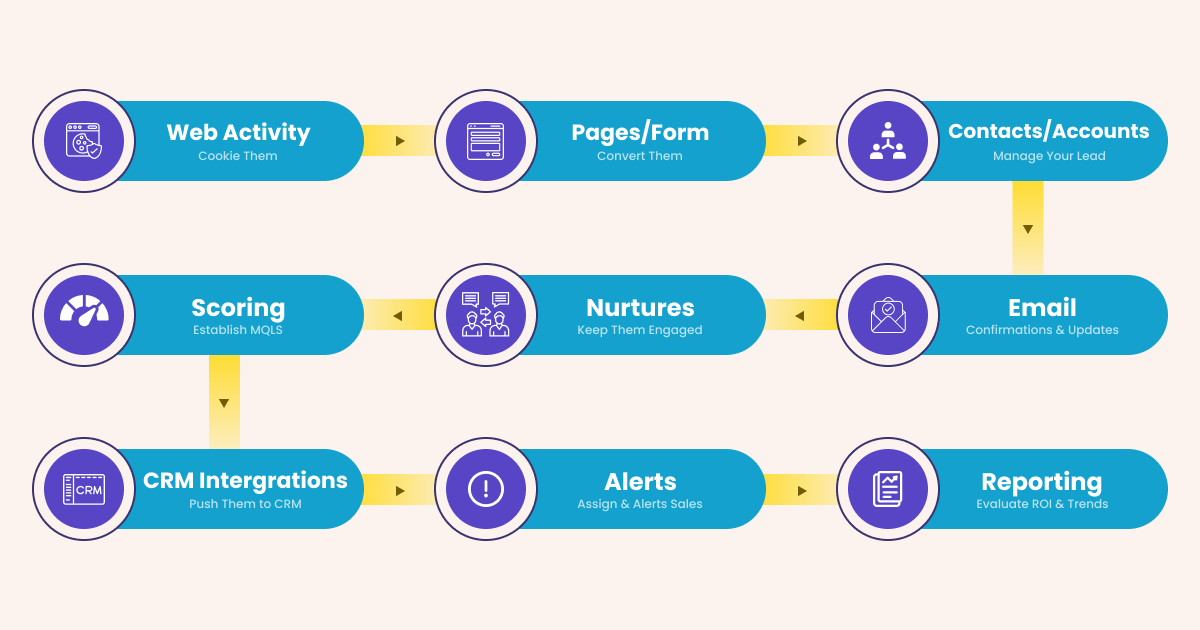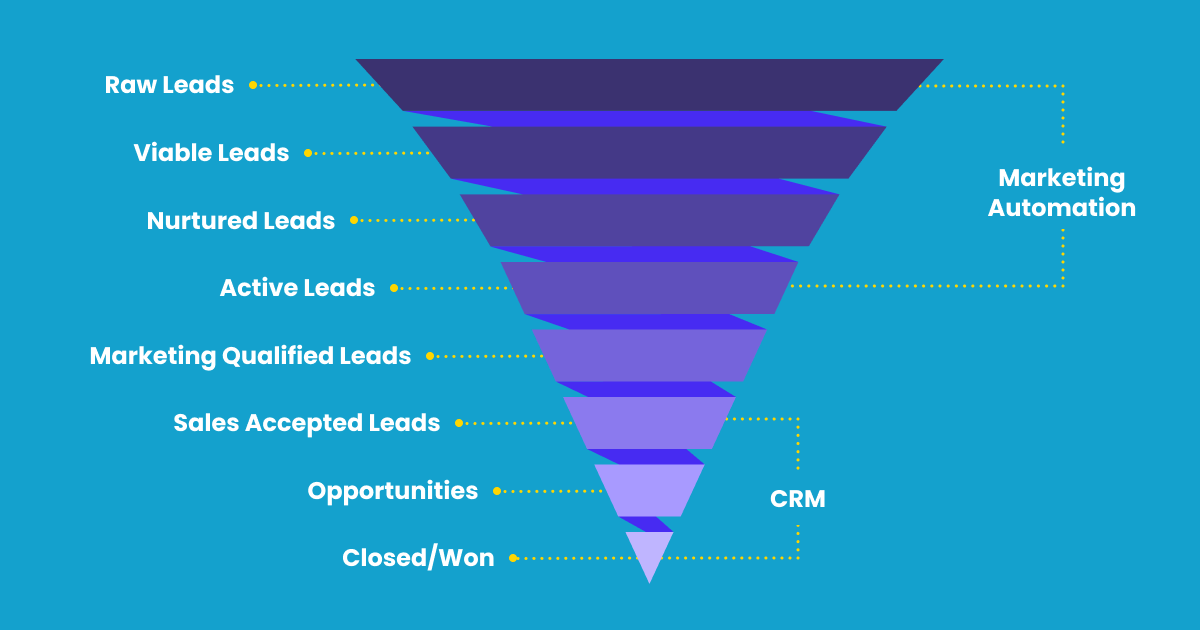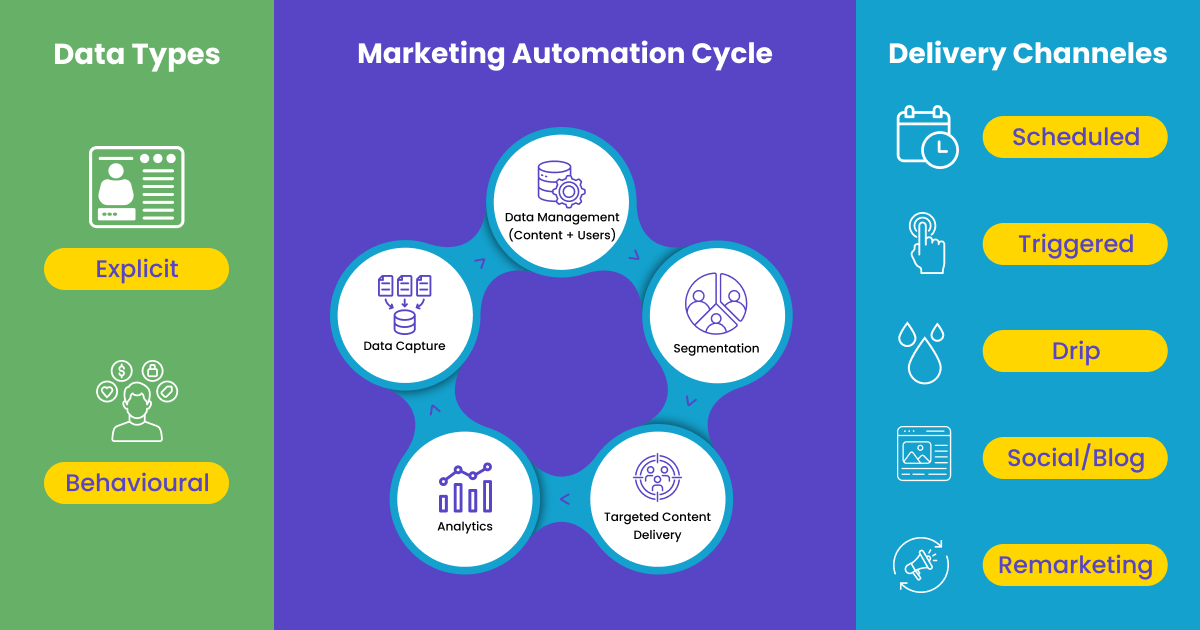According to recent studies, marketing automation can increase sales productivity by up to 14.5% while reducing marketing overhead by 12.2%. Consequently, in today’s world, businesses increasingly depend on marketing automation to streamline their marketing activities and stay ahead of the curve.
However, as the amount of data collected grows, it becomes increasingly difficult to manage and utilize it efficiently- this is where data management enters the picture.
Essentially, data management assists organizations in optimizing their marketing operations by ensuring that appropriate data is assembled, classified, and analyzed.
In this article, we’ll explore the nine essential benefits of marketing automation in data management and how it can help you gain a competitive edge in your sector.

9 Key Benefits of Marketing Automation In Data Management
Automating your marketing has many benefits for businesses looking to optimize their data management. In this section, we’ll explore the top 9 advantages that can help manage your data, beginning with preventing human error –
1. It Prevents Human Error
The first and most obvious benefit of using automation for your marketing is the fact that it helps you produce clean and accurate data consistently. It can prevent and refine any incorrect data the prospect enters with speed and accuracy without the need for human intervention. For instance, if a prospect fills out a form and misspells something, marketing automation transfers any data the prospect enters with speed and accuracy. Hence, data management the very focus of automating marketing. Without accurate data, automation software wouldn’t be as relevant or effective.
2. MA Pulls Data from Other Sources
In the current scenario, businesses face difficulties obtaining data from sources for various reasons. A common situation is that a prospect filling out a lead form may only be willing to provide basic details, such as their name, email address, and phone number. A marketer wishing to get more insights might have to search the internet to find the person’s business, physical address, and other information.
Data management is much easier with automation running behind the scenes. The moment a prospect fills out an online form, the automation software can fill in all the blanks. For example, automation softwares can use a phone number to search Google and online directories for the business name, size, revenue collected, and more. It helps businesses drive growth by helping them engage with customers via several channels, such as on-site notifications, SMS, email, Instagram, Facebook, and so on.
With automation, a complete customer profile can be devised in an instant, freeing up resources and valuable time.
3. A Focus on Quality Leads
The actual value of automating your marketing lies in its ability to define quality leads accurately. After all, lead quality isn’t just about data, it’s more about the context of the data. With automation, marketers no longer have to sift through the many piles of letters and figures to make decisions quickly. The software algorithm makes the decisions, and qualified leads are filtered out basis the intended result.
4. Data Remains Consistent Across All Channels
One of the biggest benefits is that no matter which channels the data is used on, automation can ensure data is always listed just as it’s kept in the company records. Additionally, automation can ensure that emails are tracked back and personalized with the utmost precision, keeping customers satisfied, loyal, and making certain your marketing is on the right track.
5. Improved Productivity and Efficiency
Efficiency is just one of the many benefits of automation to streamline your data management.
It can help with automating repetitive operations like email marketing, lead tracking, and social media administration. This frees up time and resources for marketing teams to focus on high-value projects like generating more powerful content, developing new tactics, and evaluating data in the long run.
5. Increased Lead Quality and Nurturing
A common problem businesses face today is their difficulty in properly analyzing and segmenting leads based on various parameters rapidly and at scale.
Automation solutions can help analyze and segment leads based on their behavior and interests, allowing marketers to supply prospects with personalized content.
As a result, higher-quality leads are generated, with enhanced lead nurturing and conversion rates.
6. Better Alignment of Sales and Marketing Teams
You’re only as good as your team, and at times, aligning your sales and marketing teams across your sales funnel or various points during the process has proven to be a challenge for many entrepreneurs and start-up business owners. Automation software can bridge the gap between sales and marketing by tracking the behavior of potential prospects across all touchpoints. By sharing this data with sales teams, marketing teams can enable better collaboration and communication between the two departments- improving the team’s efficiency in the long run.
7. Enhanced Customer Segmentation and Targeting
Businesses can increase engagement and conversion rates by delivering personalized marketing messages to specific customer segments. Marketers can leverage automation tools to help firms segment their customers based on their preferences, interests, and behavior. This makes it much easier to target your audience when they are sorted and segmented, increasing your chances of reaching out to the right customers.
8. Personalized Marketing Messages
Marketers can boost engagement, generate conversions, and develop long-term consumer connections by leveraging data to tailor messages and content. Customized marketing messages may help organizations engage with their customers more personally, leading to improved loyalty and brand advocacy. The personalized message may also help organizations stand out in a congested market, resulting in higher exposure and market share.
9. Marketing Automation Is Not An Instant Fix
If your company has poor data hygiene and you suddenly add marketing automation to the mix, you shouldn’t expect your problems to be solved overnight. It relies on accurate data to perform as expected. When you consider that nearly half of all automation users cite inaccurate or incomplete data as their biggest problem, you can see that artificial intelligence is only a tool. It is up to marketers to use the tool properly while making sure the data is correct. In other words, with automation software infused with CRM and many data management platforms, marketers must still oversee and learn how to manipulate the data to make the most of any marketing efforts. This may take some fine-tuning over time, but organizations that put time and energy into automation, as well as a complete scrubbing of all past data, should go far in the digital age.
Conclusion
Poor data management can keep you from achieving your B2C marketing goals. Whether prospects are filling out an online form or calling you directly, you shouldn’t be relying on humans to record your data, as its prone to human errors. The better alternative is to use automation for your marketing so that your data is entered just as it was intended and built upon by intelligent and intuitive algorithms. AI automation can then personalize messages, nurture leads, and predict interest and customer viability with scarily-accurate precision. The lesson is to use automation tools, so your business doesn’t end up like those relying on poor data management to achieve far-reaching goals. With exemplary data management and hygiene as your goal, marketing automation is just what the data doctor ordered.
Frequently Asked Questions (FAQs)
- Why is marketing automation important? Marketing automation is critical because it allows firms to save time, enhance productivity, and generate revenue.
- What is the main purpose of marketing automation? Marketing automation’s primary goal is to simplify and automate repetitive data management to boost efficiency, save time, and improve the overall efficacy of marketing efforts.
- Which areas can benefit from marketing automation? Marketing automation may assist firms in increasing consumer interaction and providing a more personalized experience, resulting in higher revenue and customer loyalty.


































 Surya Panicker
Surya Panicker
 Diksha Dwivedi
Diksha Dwivedi
 Vanhishikha Bhargava
Vanhishikha Bhargava



